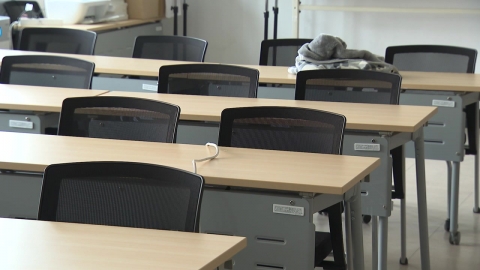Electric bicycles and electric kickboards, which are gaining popularity as a means of transportation these days, are on fire one after another.
Everyone uses lithium batteries, but they often catch fire in discarded batteries after using them, so caution is required.
Reporter facial expression reports.
[Reporter]
The white smoke is constantly coming out of the window.
The outer wall was charred by the flames.
[Fire Witness: There was a lot of smoke inside our church, too. It's full of acrid smells, and when I came out, it burned a lot.]
On the 5th, a fire broke out in a multi-family house in Icheon, Gyeonggi-do, and three residents were rescued after being isolated from the railing of the building.
It was investigated that the fire started with an electric kickboard.
The fire, which started with the battery of the electric kickboard, burned the whole house. All home appliances and appliances are in ashes, so it is impossible to recognize their shape.
On the night of the 24th, a fire broke out while charging an electric bicycle battery in Pocheon, Gyeonggi-do, and more than 80 surprised residents were evacuated.
Recently, electric bicycles and electric kickboards caught fire one after another, all of which use lithium batteries.
Waste batteries are not a safe zone either.
In Pyeongtaek, Gyeonggi-do, a factory that had collected waste lithium batteries caught fire, and in Bucheon, Gyeonggi-do, a fire broke out in a battery stored at home.
Experts explain that even discharged waste batteries can suddenly catch fire.
[Lee Chang-woo / Professor of Fire and Disaster Prevention at Soongsil Cyber University: Even though a recycling company receives it with (battery) energy density removed, there are cases where a fire breaks out over time. (Lithium battery) I don't think it's been proven to be safe yet.]
Moreover, waste lithium batteries also have very low collection rates.
In particular, in the case of electric vehicles, four out of 10 cars are obligated to return lithium batteries have not even been identified.
[Yoon Yongjin / KAIST Professor of Mechanical Engineering: We need to inspect the parts where defective batteries are manufactured, but they are not fully inspected and are being distributed in the market. In order to reduce the risk of fire, it must be managed as people's resident registration is managed from the manufacturing process.]
Recently, the government has said several times that it will prepare standards for storage and transportation of waste lithium batteries, but no clear measures have been taken yet.
I'm YTN's facial expression Woo.
a photographer;Lee Geun-hyeok
※ 'Your report becomes news'
[Kakao Talk] YTN Search and Add Channel
[Phone] 02-398-8585
[Mail] social@ytn.co.kr
[Copyright holder (c) YTN Unauthorized reproduction, redistribution and use of AI data prohibited]
Society
View the full list of articles- [Fact Check] What are the changes and generations of the elderly that change "A new old man is coming"?
- Multifamily housing on the 2nd floor of Yongsan...Six years ago, the nightmare of "The Collapse" was repeated.
- "The number of attendance days is mixed up"...Kindergarten also has a series of computer errors.
- Increasing bullying in the workplace..."Stop 'self-investigation' of users."




![[Y Issue] Deleted the position of the National Audit Office...Hive, shut your mouth.](https://image.ytn.co.kr/general/jpg/2024/1025/202410251731008385_h.jpg)

![[Site Y] "The power of emotion that the real story has"...Gong Seung-yeon's "Deadline," which is a true story of typhoon disaster.](https://image.ytn.co.kr/general/jpg/2024/1025/202410251653300767_h.jpg)

![[Exclusive] E-sports Standard, China Dominates...Korea Stolen from Jongju-guk](https://image.ytn.co.kr/general/jpg/2024/1024/202410240532296551_h.jpg)